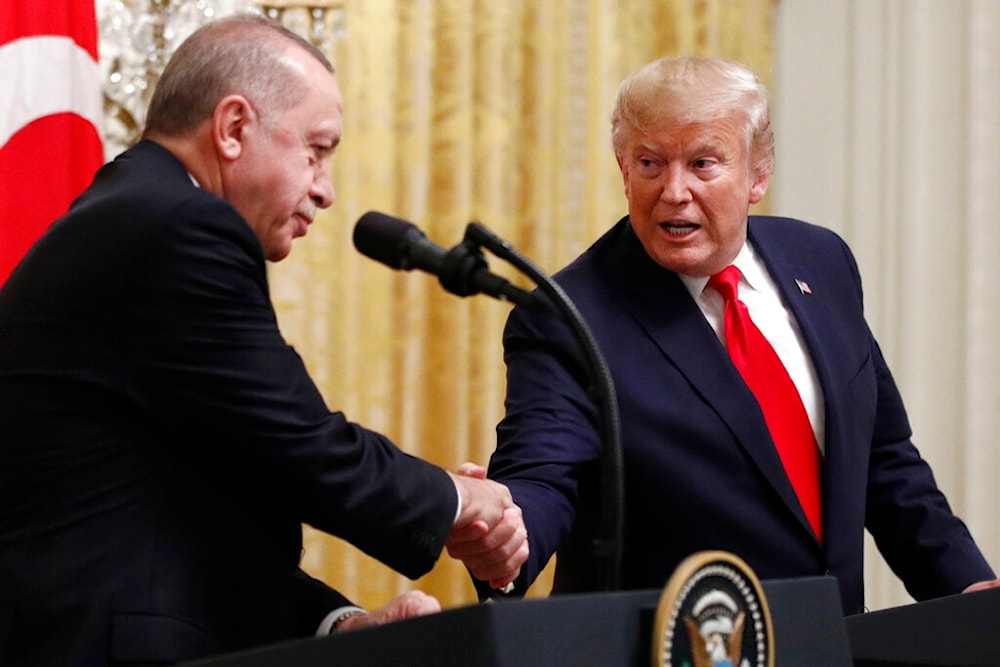Erdogan, Trump discuss Ukraine war, Syria, defense ties
Turkish President Recep Erdogan pushed for an end to US CAATSA sanctions, which were imposed after Turkey purchased Russian S-400 air defense systems.
-

In this Nov. 13, 2019 file photo, President Donald Trump shakes hands with Turkish President Recep Tayyip Erdogan during a news conference in the East Room of the White House in Washington. (AP)
Turkish President Recep Tayyip Erdogan and US President Donald Trump spoke over the phone on Sunday, discussing diplomatic efforts to end the war in Ukraine, stabilize Syria, and enhance defense cooperation, according to a statement from Erdogan's office.
During the call, Erdogan reaffirmed Turkey's support for Trump's direct and firm approach to resolving the Russia-Ukraine war, pledging to continue working toward "a just and lasting peace." However, Turkey's relationship with Russia remains complicated, as it maintains economic and defense ties with Moscow while also providing military aid to Ukraine.
The discussion also focused on Syria's future, with Erdogan calling for the removal of sanctions to help the new administration in Damascus function effectively and to facilitate the return of Syrian refugees.
However, the new Syrian leadership, backed by Turkey and the US, has been accused of sectarian massacres and human rights abuses, particularly against the Alawite minority. Reports suggest that over 1,000 people have been killed in sectarian revenge attacks, raising concerns about Turkey's role in shaping post-Assad Syria. Furthermore, women's rights activists warn that the new government is enforcing restrictive policies on women, despite early promises of inclusivity.
Additionally, Erdogan once again condemned US support for Kurdish militias in Syria, which Turkey views as an extension of the PKK, a group it considers a terrorist organization. Turkey has long criticized Washington's alliance with the Syrian Democratic Forces (SDF), warning that it undermines Ankara's national security interests.
Read more: PKK says unable to safely convene for dissolution amid Turkish attacks
Erdogan also pushed for an end to US CAATSA sanctions, which were imposed after Turkey purchased Russian S-400 air defense systems. The move led to Turkey's expulsion from the F-35 fighter jet program in 2019, a decision Ankara has sought to reverse.
He stressed the importance of resolving these disputes, stating that it was necessary to "end CAATSA sanctions, finalize Ankara's F-16 procurement process, and reintroduce Turkey into the F-35 program" to advance military collaboration between the two countries.
Contradictions in Turkey's Regional Policy: The 'Israel' Factor
While Erdogan has been one of the most vocal critics of "Israel's" war on Gaza, calling it a genocide, Turkey has continued to facilitate oil shipments to "Israel" through its Ceyhan port, reflecting contradictions in its stance.
Despite imposing a trade embargo on "Israel" in May 2024, reports confirm that oil shipments have continued through the Baku-Tbilisi-Ceyhan (BTC) pipeline, which is operated by BP and transports Azerbaijani crude oil. Around 28% of "Israel's" crude oil imports arrive through this route. Turkish officials have claimed they do not own the pipeline or the oil it transports, but Ankara collects transit fees for every barrel transported.
Recent reports revealed that tankers have continued delivering oil to "Israel", despite official statements from Turkish leadership opposing economic ties, thus raising questions about the actual impact of Turkey's so-called embargo.
Implications for 'Israel' and US-Turkey Relations
The strengthening of US-Turkey relations has also raised concerns in "Israel", which views Ankara's increasing role in Syria as a potential threat. Israeli officials have lobbied the US to maintain Russian influence in Syria to counterbalance Turkish expansion and have expressed concerns over Erdogan's alleged support for Hamas.
Turkey's regional ambitions also pose a challenge to "Israel's" strategic dominance, particularly if Ankara continues expanding its influence in Syria with Washington's backing.
Read more: 'Israel' seeks to maintain Russian presence in Syria: Report
A Fragile Partnership with Unresolved Tensions
While the Erdogan-Trump conversation signals ongoing efforts to strengthen US-Turkey ties, contradictions in Turkey's policies remain evident.
Ankara's simultaneous criticism of "Israel" while continuing indirect trade, its dual relationship with Russia and Ukraine, and its controversial backing of Syria's new government all complicate its diplomatic standing.

 4 Min Read
4 Min Read








